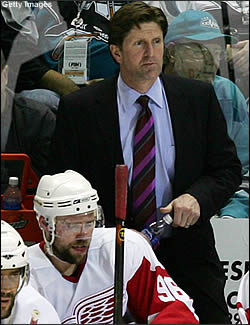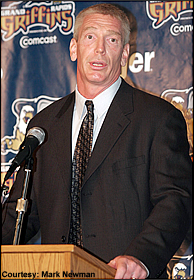by John McGourty || NHL.com
 |
| Red Wings’ head coach Mike Babcock enjoyed the chance to spend time with coaches Mike Stothers and Jim Paek of the AHL’s Grand Rapids Griffins when the two teams held a joint training camp. |
NHL teams put a lot of time and effort into developing players. A considerable about of money is spent on scouting young hockey players all over North America and Europe.
The pipeline of talent is absolutely vital to the success of an NHL team, so clubs want to have players who are ready to step into the lineup and produce at the NHL level.
As a result, most teams have found it’s much wiser and efficient to coordinate the philosophies of the NHL coach and the minor-league coaches, especially those at the AHL level.
The Detroit Red Wings have their AHL affiliate in Grand Rapids, Mich. Both the Red Wings and the Grand Rapids Griffins begin training camp at Traverse City, Mich., then have a preseason exhibition-game tour and finish at Joe Louis Arena before the Griffins assemble in Grand Rapids for the AHL season. This is the first year both teams have done their last-minute grooming in Detroit.
Red Wings coach Mike Babcock said he enjoyed the opportunity to spend so much time with first-year Griffins coach Mike Stothers and his assistant, Jim Paek, a Stanley Cup winner in Pittsburgh.
"The No. 1 priority is development," Babcock said. "When we call up someone, he better be ready and by that I mean, his fitness is tops, he does things right and he understands how the NHL team does it. It’s really important that we’re on the same page."
Believe it or not, that extremely logical approach sometimes wasn’t the case for some NHL teams. A few years back, players in one NHL organization complained that they were being taught to play one way in the minor-leagues and then asked to employ a different system at the NHL level. It was a barren era for that organization as few draftees succeeded in securing NHL jobs. Some of those players are with other NHL teams now, but none are stars. Whether the team drafted badly or developed poorly or both was a matter of internal discussions, as well as fan criticism, and the team cleaned house in the front office.
Babcock’s approach isn’t a one-way street. While he wants players who are ready to step in and help the Wings, Babcock has a good understanding of Stother’s situation. Babcock was the coach of the AHL Cincinnati Mighty Ducks from 2000-2002 while Bryan Murray was coaching in Anaheim.
"When I moved up to Anaheim, Brad Shaw took over in Cincinnati and when I came here to Detroit, Greg Ireland was coaching Grand Rapids and now, Mike Stothers," Babcock said. "Combined training camp is a great opportunity to be around the other coach. We get to build a relationship and talk about the things we are seeing. It doesn’t make any difference whose idea it is as long as it works. If I see him doing something I like, I say; ‘Let’s do it.’
"The other coaches are likely to do a lot of the same things we’re doing. I’d watch Mike drill the team and think to myself; “That’s a different way of doing it.’ Obviously, we’re not hiring guys who don’t know what they are doing.
"I don’t sit down with them before rookie camp. I know what I know and I know Mike has a great hockey background. I wanted to see what he brings to our rookie camp. His assistant, Jim Paek, won two Stanley Cups in Pittsburgh. We have good people in the organization who have a lot to offer. Why not share in the success?"
Babcock realizes he can’t pull the strings on the Griffins from Detroit; that Stothers and GM Bob McNamara have to be their own men.
"Mike has to win games in Grand Rapids," Babcock said. "It’s great to develop players, but he has to win games if he wants to keep working!"
That really isn’t a problem and shouldn’t be a reason for friction between the NHL and AHL coaching staffs. After all, if a system is good enough to work in the NHL, it ought to work at the minor-league level.
"Our minor-league coaches were here right up until the final week before the season," Babcock said. "With nine preseason games, we needed two teams. We had both teams working on things together. They ran their units, but we’re putting in the same game plan. We’re all part of the Red Wings organization and winning at the NHL level is the biggest priority.
 |
| "We appreciated what they presented to us at Traverse City and we’ve tried to instill in our guys the thought processes and systems that Detroit is implementing." — coach Mike Stothers |
"But at training camp, we can teach everyone how we do our power play, our penalty kill, our forecheck, our D-zone coverage, everything," Babcock said. "It’s easier for everyone if, when they come up to the NHL team, they can play without thinking. The way we prepare in Detroit is to establish the work ethic, then put in place a structure that allows skill to come out. To do that, you have to be playing, not thinking."
Babcock compared "play, not think" to a golfer’s muscle memory.
"That’s a very good comparison," he said. "I’m a bad golfer now because I only get to play three or four times a year. I used to just play, but now I’m thinking about transferring my weight, having an inside-out swing and thinking all this stuff instead of just swinging the club. Thinking is what you do at practice. At night you play. You build your foundation in practice because, and I’ve found this to be very much like life itself, in tough times you revert back to who you are. If you’ve built a solid foundation, you have a chance to be successful."
Babcock said there is a new reality in the NHL, due to team salary limits.
"Under the salary cap, you don’t have extra guys anymore," Babcock said. "The ‘depth’ of the organization is health. Scotty Bowman always had an extra line sitting in the press box. Those days are gone. As soon as you’re not healthy, you’re depth is gone. That’s why minor-league development of prospects is more important than ever. When they get brought up, they have to be ready to play your system."
"Detroit has been great about telling us that we can implement any system we want," Stothers said. "We can coach any way we want. There’s nothing etched in stone, nothing mandated. But I think it’s good to train similarly.
"We appreciated what they presented to us at Traverse City and we’ve tried to instill in our guys the thought processes and systems that Detroit is implementing. It makes it easier for our guys when and if they get called up. There are differences, though. The mode of travel is different and presents an additional fatigue factor. The skill sets are not the same. Things are not done at the same speed, but I still think the Red Wings’ system can be used as a guideline. It gives us something to work toward and build off of.
"If Detroit doesn’t need to use one of our guys, good, that means they’re healthy. But if our guys do get called up, it’s good if they know what is expected of them. They won’t feel uncomfortable. Having them aware of how the NHL club plays, is a win-win situation for both teams and the players."

































